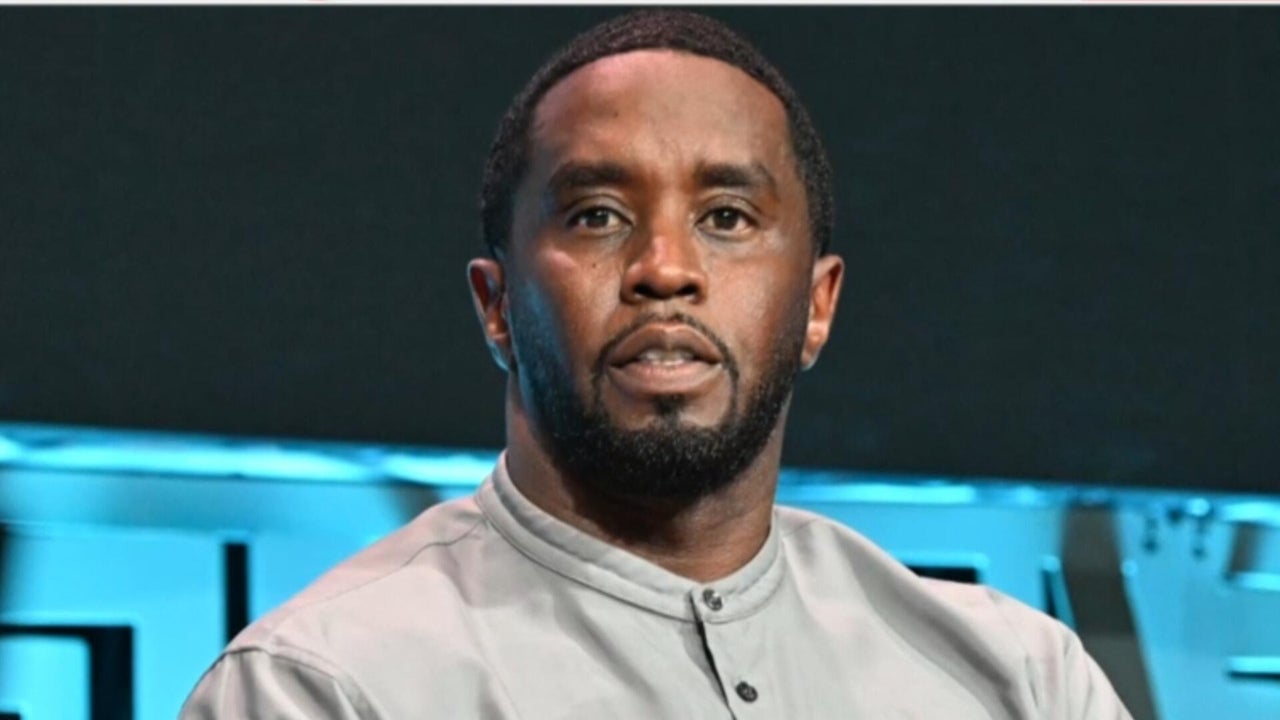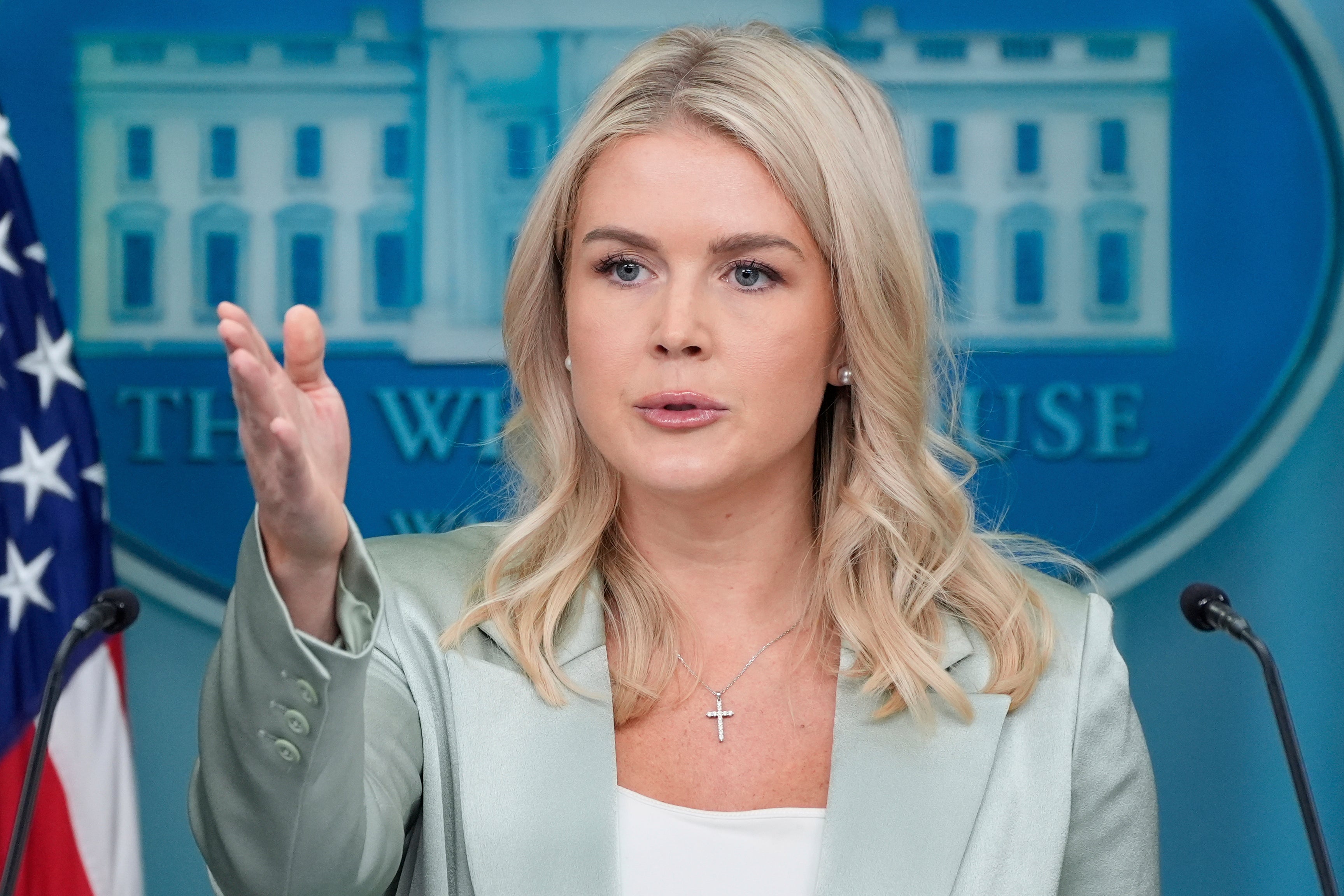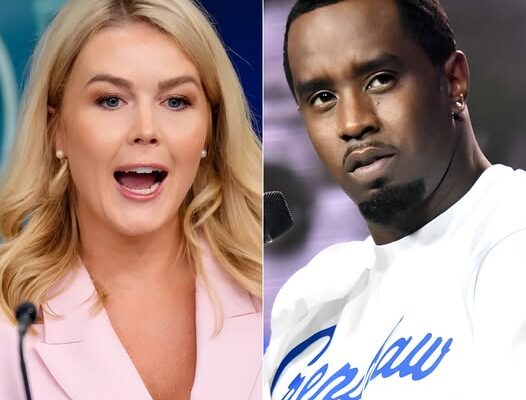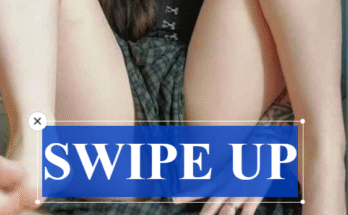The entertainment world is reeling after the bombshell sentencing of hip-hop mogul Sean “Diddy” Combs, who was sentenced to four years and two months in federal prison for two counts of transportation to engage in prostitution.
The news sent shockwaves across social media. But it was Karoline Leavitt, a rising conservative firebrand and former White House communications aide, who ignited the loudest debate with her scathing reaction—one that tore through Hollywood’s polished façade and reignited a national conversation about justice, hypocrisy, and celebrity privilege.

Within hours of the sentencing, Leavitt posted a statement that quickly went viral across platforms.
“If this were a conservative artist,” she wrote, “they would have been convicted a decade ago — but because he’s a Hollywood darling, he only gets a few years in prison and is covered up with hypocritical praise.”
The words struck a chord, echoing through political circles, entertainment boards, and newsrooms. What had begun as a moment of legal reckoning for one of hip-hop’s most powerful figures had now exploded into a broader cultural war.
The Case That Shook the Industry
The sentencing capped a months-long legal saga that began with explosive testimony from multiple women alleging abuse, coercion, and exploitation inside Diddy’s lavish empire.
Federal prosecutors painted a disturbing picture of a man who, despite his success, used money, fame, and power to manipulate and control women. The judge’s remarks were searing:
“A history of charity and good works,” the judge told Diddy directly, “can’t wash away years of abuse, drugs, and what this court calls ‘freak offs and hotel nights.’ There is massive evidence that you subjugated women for years, fueled by your wealth and ego.”
Diddy was given credit for 14 months of time served, leaving 36 months—three years—to serve in prison.
As the former music icon was led away in cuffs, reactions poured in from across the entertainment world. But few were as blistering—or as politically charged—as Karoline Leavitt’s.
Leavitt’s Blast: “This Isn’t Justice, It’s a Show”
Appearing later that evening on a conservative news broadcast, Leavitt doubled down.
“This isn’t justice,” she said. “It’s a show. Hollywood only speaks out when it can no longer cover up the truth — and when it’s one of their own, they rewrite the narrative. They don’t demand accountability; they hand out sympathy.”
Leavitt accused the entertainment industry of “glorifying itself with justice,” pretending to celebrate accountability while maintaining a closed system of silence and complicity.
“For years,” she added, “people in power knew what was happening. The drugs, the manipulation, the exploitation. But as long as Diddy was profitable—hosting award shows, selling records, bringing ratings—they said nothing. Now that he’s exposed, they’re all pretending to be shocked. It’s a performance, and the audience should know it.”
Online TV streaming services
Hollywood’s Response
Predictably, Hollywood figures rushed to respond—some condemning Leavitt, others quietly acknowledging she wasn’t entirely wrong.
A-list actress Taraji P. Henson called Leavitt’s comments “insensitive political opportunism,” tweeting:
“This is not about left or right. This is about women who were hurt. Don’t use their pain to score points.”
But one veteran entertainment journalist admitted privately:
“There’s truth in what she said. Hollywood did turn a blind eye. The whispers about Diddy have been around for decades, but he was too powerful, too profitable, too connected.”
The entertainment establishment now finds itself in a rare position—forced to reckon not just with Diddy’s actions, but with the system that enabled him for so long.
Social Media Frenzy
Leavitt’s post ignited a social media firestorm. On X (formerly Twitter), her name trended alongside #DiddySentence and #HollywoodHypocrisy.
Some users praised her for saying what “no one in mainstream media would dare say.” Others accused her of turning tragedy into partisan theater.
One user wrote:
“Leavitt may be controversial, but she’s not wrong. If this was a conservative, the media would’ve crucified them years ago.”
Another countered:
“She’s politicizing abuse. Justice shouldn’t depend on your ideology.”
By the next morning, Leavitt’s statement had been viewed over 40 million times, sparking think pieces, debates, and panel discussions across the political spectrum.
A Pattern of Silence
Leavitt’s words touched a deeper nerve because they echoed something many Americans have begun to notice: a pattern of selective accountability in celebrity culture.
The industry that once lionized figures like Harvey Weinstein, R. Kelly, and Diddy has often acted only after public outrage makes silence impossible.
“They didn’t wake up one morning and decide to care,” Leavitt said. “They acted because they had no choice.”
Her comments tap into a broader frustration—one that transcends party lines. The question she poses isn’t simply about politics; it’s about how fame, power, and influence warp justice.
A Divided Nation Watches

Cable news networks seized on the story, devoting hour-long segments to the cultural fallout. Conservative commentators praised Leavitt for “calling out hypocrisy,” while liberal analysts accused her of “exploiting moral outrage.”
But across all platforms, the same question kept surfacing: Is justice equal—or does celebrity status create a shield?
Even some mainstream anchors cautiously acknowledged the pattern. On CNN, one host said:
“Karoline Leavitt’s words may be harsh, but she’s voicing something that resonates with millions of Americans. People are losing faith that fame and morality can ever coexist in this country.”
The Cost of Speaking Out
For Leavitt, controversy is nothing new. A former White House press official under Donald Trump, she’s long been a lightning rod for cultural debates—fearless, provocative, and polarizing in equal measure.
But even her critics admit one thing: she’s effective. Her soundbites dominate news cycles, forcing uncomfortable questions into the mainstream.
Political analyst Tom Whitman noted:
“Leavitt understands the power of outrage in modern politics. She doesn’t wait for the narrative—she creates it. And in doing so, she’s made herself one of the most recognizable conservative voices of her generation.”
Where Does This Leave Diddy—and America?
As Diddy begins his prison term, the broader reckoning is only beginning. His downfall has reopened wounds across industries—from music to media to politics—forcing uncomfortable conversations about power and accountability.
Leavitt’s remarks, while controversial, have amplified that conversation. In challenging the industry’s moral authority, she has reignited public scrutiny not just of Diddy, but of Hollywood’s moral double standard.
“This is bigger than Diddy,” she said in her final comment. “It’s about who gets to be forgiven—and who gets destroyed. If justice is real, it should look the same no matter who you are, how famous you are, or who you vote for.”
Conclusion: The Echo That Won’t Fade
The image of Diddy in handcuffs may fade from the headlines in weeks. But Karoline Leavitt’s blistering critique has carved itself into the broader conversation about justice and celebrity privilege.
As one commentator put it:
“Diddy lost his freedom. But Hollywood may have lost its last illusion—that power and wealth can always rewrite morality.”
Whether Americans agree with Leavitt or not, her words have forced a reckoning:
Who does justice truly serve—the people, or the powerful?
And as the debate continues to rage, one thing is clear: Karoline Leavitt’s voice has once again turned a scandal into a mirror—forcing America to look directly at itself.



